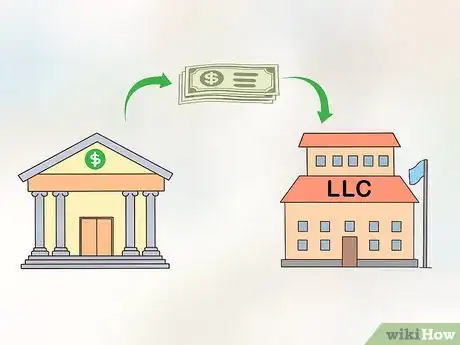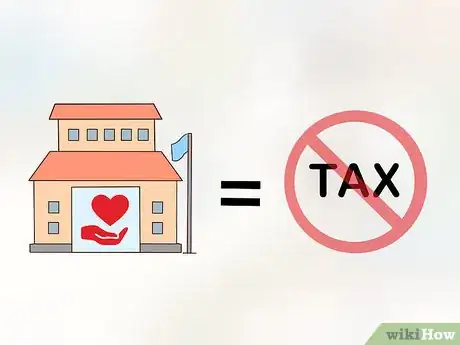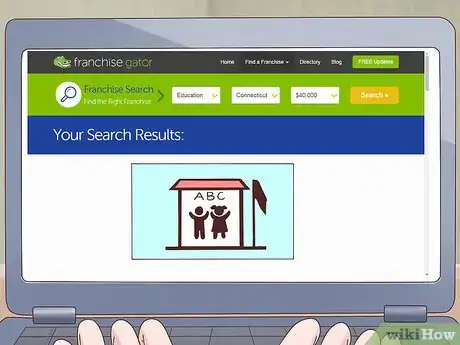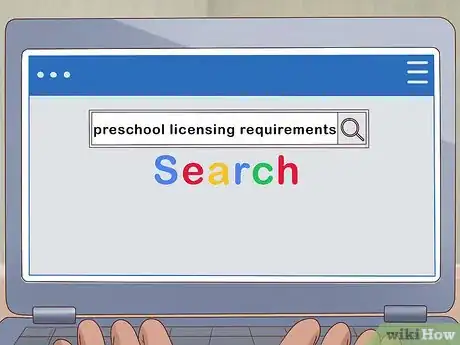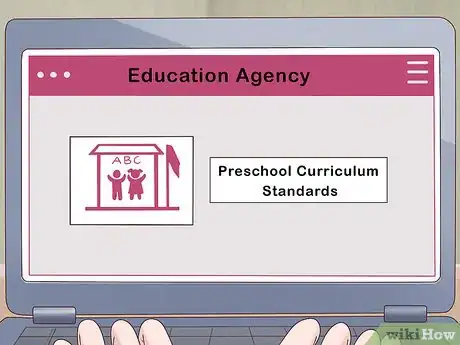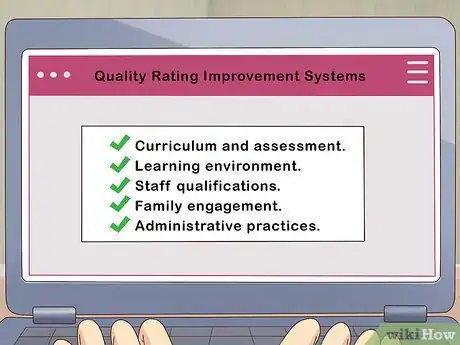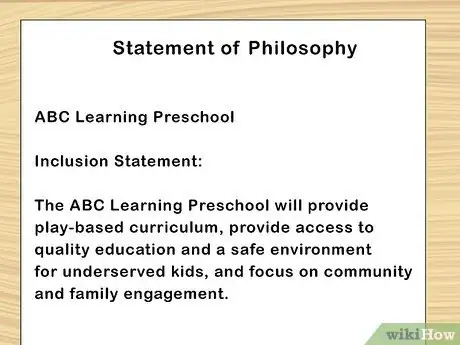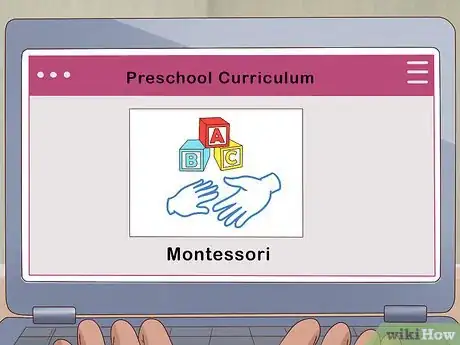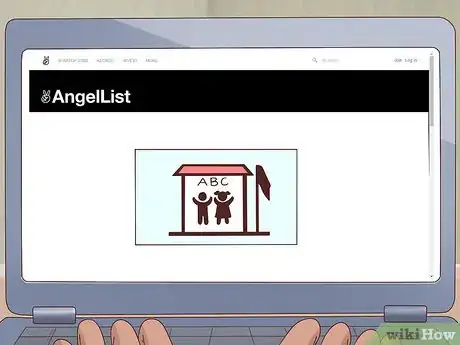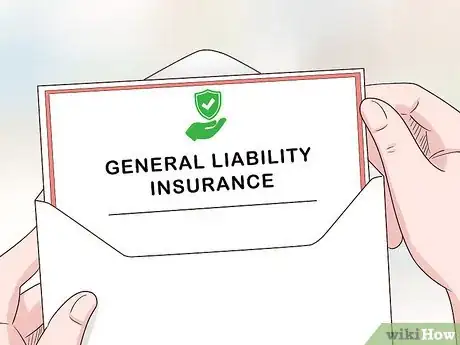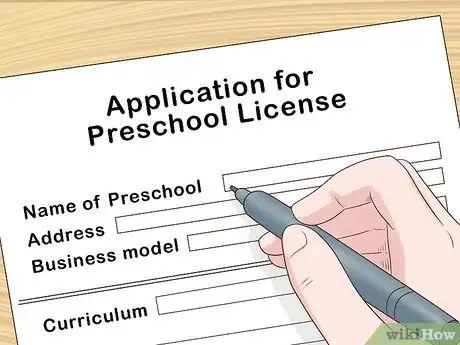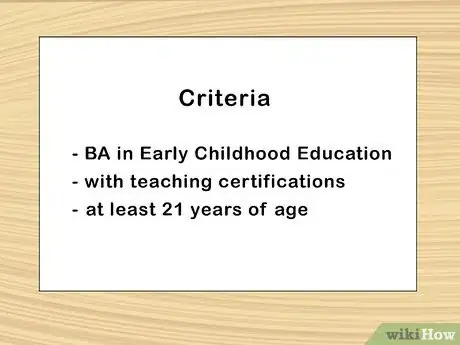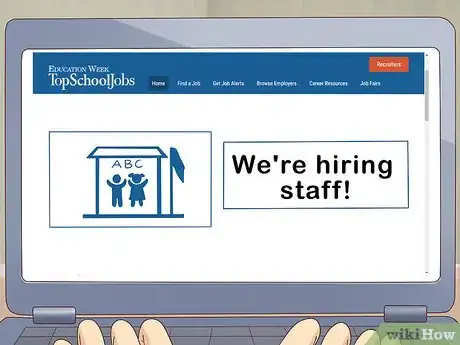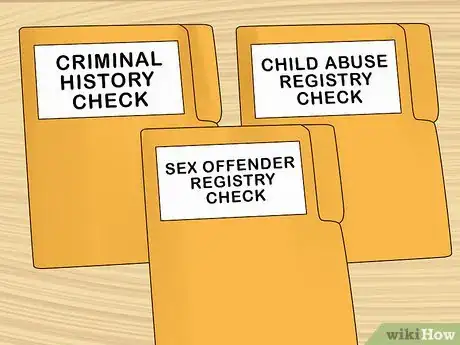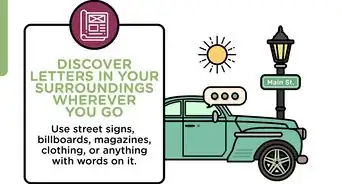This article was co-authored by Bianca Solorzano, M.Ed. and by wikiHow staff writer, Megaera Lorenz, PhD. Bianca Solorzano is an Infant Development Specialist, Montessori Consultant, and the Founder of Baby Tour Guide Inc. Through her company, she helps parents, educators, and caregivers optimize baby and toddler development using a Montessori Lens. She does so by providing one-on-one consulting, running her blog, and hosting the Montessori Babies Podcast. With more than 11 years of experience in child development, she specializes in supporting parents in approaches such as purposeful language, environment setup, toys/activities that aid in development, positive redirection and behavior, and directed choice. Bianca holds a BS in Child and Adolescent Development with a focus in Early Childhood Education from California State University, Fullerton, a Masters in Montessori Education from Loyola University Maryland, and the AMI International Montessori Certification from The Montessori Institute of San Diego for children Birth-3 Years. Bianca is also a member of the National Association for the Education of Young Children (NAEYC).
There are 18 references cited in this article, which can be found at the bottom of the page.
wikiHow marks an article as reader-approved once it receives enough positive feedback. This article has 20 testimonials from our readers, earning it our reader-approved status.
This article has been viewed 353,946 times.
If you’re passionate about early childhood education, starting a preschool may be a good option for you. Start by finding out about your community’s needs and local laws. If you think there’s a need for a new preschool in your area, take time to develop a program philosophy and business plan. You will need to gather support and financial resources, find a good space for your preschool, and hire some staff. Once everything is in place, it’s time to start advertising your new school.
Steps
Taking Care of Legal Details
-
1Fill a need in your community. In order for your preschool to be successful, it must fill a need in your area. Look up other preschools near you and learn a little about each of them. Try to find out things like:[1]
- How many preschools are currently operating in your area.
- Whether any particular populations of kids are underserved by preschools in your area (e.g., kids with disabilities or kids from low-income families).
- What kinds of educational philosophies or approaches are represented in your community’s preschools.
- Which schools are successful, and which are not (e.g., based on your local school quality rating system or parent reviews).
- The typical budget and tuition rates for preschools in your area.
- You can get a lot of this type of information through your local department of commerce, child resource agencies, or the Small Business Administration.
-
2Start a sole proprietorship if you want to keep it simple. There are many possible business models for a preschool, and the best one for you will depend on your resources. If you are planning to run a small school as the only owner, a sole proprietorship may be your best option.[2]
- Sole proprietorships are relatively inexpensive to start and maintain, but you will be personally liable in case of any accidents that take place at your school. Any debts will also be your personal responsibility.
- You will also need to pay both personal and business taxes related to your school.
- This may be a good option if you are planning to run a small preschool from your home.
Advertisement -
3Create a limited liability corporation (LLC) to protect your assets. An LLC is a good option if you plan to hire employees for your school, or if your school will be financed by a bank. One major advantage of an LLC is that your personal assets will be protected in case of a lawsuit.[3]
- You may need to pay higher taxes to run an LLC than you would for a sole proprietorship.
-
4Establish a non-profit school if you want tax exemption. Non-profit schools are funded by private donors, and are also eligible for government support.[4] This may be an especially good option if you want to start a school for disadvantaged or underserved kids in your community.
-
5Form a parent cooperative if you are interested in a parent-run school. At a co-op school, the parents of the students share in all aspects of the school’s operation, from hiring staff to assisting in the classroom.[7] Reach out to other parents in your community to find out if they are interested in forming a cooperative school.
- Organizations like Parent Cooperative Preschools International (https://www.preschools.coop/) can help you get started and connect you with helpful resources.
-
6Work with a preschool franchise to build on an established model. If you don’t want the hassle of starting a business from scratch, there are several preschool franchises on the market. Franchises come with the advantage of a recognizable brand and a template in place for curriculum and business operations.
- Franchises are potentially very profitable, but you must also be prepared to invest a lot of money at the outset.[8]
- To find potential preschool franchise opportunities, do a general web search or try a website like FranchiseGator.com.
-
7Work with a business lawyer if you need help. If you’re not sure how to begin, contact a business lawyer in your area to discuss the pros and cons of each possible preschool business model. They can also help you navigate the licensing requirements for preschools in your area.
-
8Fulfill any licensing requirements in your area. Licensing requirements for preschools vary widely from one place to another, so you will need to familiarize yourself with the laws in your state, province, or municipality. Do a search using terms like “preschool licensing requirements in Chicago.”
- You may need to contact multiple agencies or offices in your area for full information on licensing requirements.
- In Illinois, for example, you must obtain childcare licenses from the Illinois Department of Human Services and the Department of Children and Family Services. If you plan to establish a preschool in Chicago, your facility must also adhere to guidelines established by Chicago’s Department of Public Health.[9]
- Licensing standards may include things like background and health checks for all staff, minimum space requirements per child, building safety requirements, and guidelines for appropriate educational programming.
- In the U.S., you can find licensing information for your state with this database: https://childcareta.acf.hhs.gov/licensing.
-
9Conform to preschool curriculum standards in your area. Some areas have regional curriculum standards for early childhood education. These standards are designed to guide educators in the development of effective and appropriate educational programming for preschool-aged children. Familiarizing yourself with these standards will help you prepare a stronger plan as you develop your school.
- Do a search using terms like “state early learning standards Texas.”
- The education agency in your state, province or municipality may provide training workshops and educational materials for educators interested in learning about these guidelines.
-
10Comply with quality rating system requirements in your area if applicable. Check with your local board of education to find out about the laws pertaining to preschool quality rating systems. Many states in the U.S. participate in QRIS (Quality Rating Improvement Systems) for preschools, and in some states, schools are required to meet QRIS standards. While the names and standards of these systems vary from one state to another, they tend to assign points based on the quality of each school’s:[10]
- Curriculum and assessment.
- Learning environment.
- Staff qualifications.
- Family engagement.
- Administrative practices.
Developing a Preschool Program
-
1Write a statement of philosophy. A strong educational philosophy is the foundation for any successful preschool. Your philosophy statement should outline, in a few paragraphs, the core values and approaches that you want your school to embody. If you plan to adhere to a particular set of educational standards or a specific educational philosophy (such as the Montessori approach), mention this in your statement.
- For example, you might write a statement emphasizing that your school will provide play-based curriculum, provide access to quality education and a safe environment for underserved kids, and focus on community and family engagement.
- There are numerous examples of preschool philosophy statements online. These can serve as a good model for your statement. For example, you might start by reading over the samples here: https://ccids.umaine.edu/wp-content/uploads/sites/26/2015/01/Sample-Program-Philosophy-Statements.pdf.
-
2Compose a business plan. Once you’ve done some research and established a basic philosophy for your school, you can begin the process of putting together a more detailed plan for your school. There are numerous ways to construct a business plan. The most important thing is to include all the key information, such as:[11]
- An overview of what your research on the preschool market in your community.
- Basic information about the school you plan to establish, such as the school’s name and legal structure (i.e., will it be a non-profit school or an LLC?).
- Information about your goals and philosophies for the school.
- A plan for meeting your area’s licensing requirements.
- A plan for what type of location you would like to use (e.g., will you operate out of your home or rent a commercial space?).
- A budget for expenses such as rent, school supplies, utilities, staff salaries, food, maintenance, and playground equipment.
- Hiring and marketing plans.
-
3Develop your curriculum. It will serve you well to have strong ideas about your educational programming right from the start. Look at the different styles of preschool curriculum, and consider which ones fit best with your educational philosophy. A few of the most common educational approaches include:[12]
- Montessori, a teaching approach that focuses on the hands-on, individualized learning.
- Waldorf, which focuses on establishing clear and consistent routines and group-oriented learning.
- Project-based approaches that focuses on the individual interests and strengths of each child.
- Play-based curriculum, which focuses on unstructured, hands-on learning without a strong focus on academic content.
- Academic approaches, such as High/Scope, that focus on building a strong foundation for academic skills such as reading and math.
Gathering Resources
-
1Reach out to your local early childhood coordinator. Check with your local school district and find out who the early childhood coordinator is. This person can play an invaluable role in helping you find the resources you need to start your preschool.[13]
- If your school district does not have an early childhood coordinator, find out if your state or province has an early childhood education network. These networks connect various local agencies that are involved in early learning, and they may have a variety of resources available for you.
- Try doing a search for terms like “early childhood coordinator my state.”
-
2Contact potential investors if your school is for-profit. Even if you’re starting a for-profit preschool, you may find it hard to attract traditional investors.[14] It’s not impossible, however. One good place to start is on websites like AngelList (https://angel.co), where you can create a profile and advertise directly to investors who are interested in funding education startups.[15]
- In order to attract investors, you will need a strong business plan that clearly demonstrates why your preschool is needed in your community.
- Reach out to people in your professional network to find out if they know anyone who might be interested in investing.
- You can also consider running a crowdfunding campaign on a website like Kickstarter or Indiegogo to get support for your school.
-
3Apply for government grants if you need additional funding. Government grants are another good source of funding for new preschools. Your school may qualify for a small business grant, an education grant, or both, depending on where you live and the nature of your school.[16]
- If you live in the U.S., contact the lead child care agency in your state to find out what kinds of grants and funds are available for new preschools. You can find the contact information for your state’s lead agency here: https://www.acf.hhs.gov/occ/resource/ccdf-grantee-state-and-territory-contacts.
- You can find more information by contacting your local Child Care Resource and Referral (CCR&R) office. To find CCR&R information for your area, visit http://www.childcareaware.org/ or call Child Care Aware at 1-800-424-2246.
- The Small Business Administration can also help you connect with financial resources if you are hoping to start a preschool in the U.S.
-
4Choose an appropriate space for your school. Unless you are planning to operate the preschool out of your home, you will probably need to lease a space. You may be able to lease a commercial space in your area, or even rent space in a church or community center. Bear in mind that you will need to:[17]
- Ensure that your space confirms to local licensing, zoning, health, and safety requirements.
- Select a space that is large enough to accommodate all the students and staff safely and comfortably.
- Find a space that is comfortable, pleasant, and has sufficient outdoor play space.
- Check that your space has bathrooms, room for storage, areas where staff can work, and areas where children can eat, rest, play and learn.
-
5Get insurance for your school. No matter what type of preschool you choose to open, you will need some type of business insurance. At minimum, you will need general liability insurance. You may also need other types of insurance, such as professional liability insurance or commercial property insurance.
- If you live in the U.S., consult the Small Business Administration’s website on the different types of business insurance here: https://www.sba.gov/business-guide/launch-your-business/get-business-insurance.
- The types of insurance you need may also vary depending on local preschool licensing laws.
-
6Apply for your preschool license(s). Once you feel you are ready to meet the local licensing requirements, you will need to fill out an application packet. Contact your local school licensing office(s) to discuss how to proceed and what types of documentation you may need to provide in order to get your facility licensed.
Hiring Staff
-
1Find out how many staff members you will need. Most places have specific regulations about the ratio of teachers and other childcare staff to children in a preschool or other childcare facility.[18] Check with your local licensing office to determine the minimum number of teachers and other childcare staff you will need to hire for your school.
- Also consider what other staff members your school may need, such as administrators and maintenance staff.
-
2Determine your criteria for hiring school staff. Depending on local regulations and your personal preferences, you may be looking for a variety of characteristics in your staff. Check with your local licensing agencies to find out whether preschool teachers and staff in your area are required to have certain qualifications, such as:[19]
- Specific degrees or types of education (e.g., a BA in Early Childhood Education).
- Teaching certifications related to early childhood education.
- A certain level of direct teaching experience (e.g., do teachers need to have spent a certain amount of time student-teaching before becoming full-time preschool teachers?).
- There may also be age requirements for some positions. E.g., in Maryland, a preschool director must be at least 21 years of age.[20]
-
3Advertise open staff positions online. You can use general job boards like Indeed.com, or advertise on education-specific job boards like TopSchoolJobs.com. Be sure to provide detailed information about each position, including job title, responsibilities, required and desirable qualifications, and instructions for submitting applications.
-
4Ask people in your professional network for recommendations. If you know other educators or school administrators, they may be able to recommend good teachers or other people with early childhood education experience who are looking for jobs in your area. Make a few phone calls or send out some emails letting your connections know that you are hiring.
- Provide specific information about what you are looking for. For example, you might say, “I’m starting a new Montessori preschool. Do you know any good American Montessori Society certified teachers who are looking for work?”
-
5Have potential staff members submit to required background checks. Once you’ve found some good potential candidates, they will have to be vetted in accordance with your local licensing agency’s requirements.[21] Contact your licensing office to find out which checks are required and what steps you need to take in order to run checks on potential employees. Typically, all staff members will need:
- State and federal criminal history checks, based on name and fingerprints.
- A child abuse registry check.
- A sex offender registry check.
Expert Q&A
Did you know you can get premium answers for this article?
Unlock premium answers by supporting wikiHow
-
QuestionShould I consider bringing a "room parent" into my preschool?
 Bianca Solorzano, M.Ed.Bianca Solorzano is an Infant Development Specialist, Montessori Consultant, and the Founder of Baby Tour Guide Inc. Through her company, she helps parents, educators, and caregivers optimize baby and toddler development using a Montessori Lens. She does so by providing one-on-one consulting, running her blog, and hosting the Montessori Babies Podcast. With more than 11 years of experience in child development, she specializes in supporting parents in approaches such as purposeful language, environment setup, toys/activities that aid in development, positive redirection and behavior, and directed choice. Bianca holds a BS in Child and Adolescent Development with a focus in Early Childhood Education from California State University, Fullerton, a Masters in Montessori Education from Loyola University Maryland, and the AMI International Montessori Certification from The Montessori Institute of San Diego for children Birth-3 Years. Bianca is also a member of the National Association for the Education of Young Children (NAEYC).
Bianca Solorzano, M.Ed.Bianca Solorzano is an Infant Development Specialist, Montessori Consultant, and the Founder of Baby Tour Guide Inc. Through her company, she helps parents, educators, and caregivers optimize baby and toddler development using a Montessori Lens. She does so by providing one-on-one consulting, running her blog, and hosting the Montessori Babies Podcast. With more than 11 years of experience in child development, she specializes in supporting parents in approaches such as purposeful language, environment setup, toys/activities that aid in development, positive redirection and behavior, and directed choice. Bianca holds a BS in Child and Adolescent Development with a focus in Early Childhood Education from California State University, Fullerton, a Masters in Montessori Education from Loyola University Maryland, and the AMI International Montessori Certification from The Montessori Institute of San Diego for children Birth-3 Years. Bianca is also a member of the National Association for the Education of Young Children (NAEYC).
Infant Development & Montessori Consultant Room parents are amazing support systems to each classroom! They can support the classroom based on the needs of the class, beginning by bridging the gap between the teachers and parent involvement. They can help organize and plan events, organize weekly snack schedules, organize classroom art activities, help gather classroom gifts, gather volunteers for events, and so much more.
Room parents are amazing support systems to each classroom! They can support the classroom based on the needs of the class, beginning by bridging the gap between the teachers and parent involvement. They can help organize and plan events, organize weekly snack schedules, organize classroom art activities, help gather classroom gifts, gather volunteers for events, and so much more. -
QuestionHow do I start a preschool in my home?
 wikiHow Staff EditorThis answer was written by one of our trained team of researchers who validated it for accuracy and comprehensiveness.
wikiHow Staff EditorThis answer was written by one of our trained team of researchers who validated it for accuracy and comprehensiveness.
Staff Answer wikiHow Staff EditorStaff Answer
wikiHow Staff EditorStaff Answer -
QuestionDo I have to get permission to open a playschool and daycare?
 wikiHow Staff EditorThis answer was written by one of our trained team of researchers who validated it for accuracy and comprehensiveness.
wikiHow Staff EditorThis answer was written by one of our trained team of researchers who validated it for accuracy and comprehensiveness.
Staff Answer wikiHow Staff EditorStaff Answer
wikiHow Staff EditorStaff Answer
References
- ↑ https://www.geteduca.com/blog/starting-preschool-child-care/
- ↑ https://www.sba.gov/sites/default/files/files/pub_mp29.pdf
- ↑ https://www.sba.gov/sites/default/files/files/pub_mp29.pdf
- ↑ https://www.usa.gov/start-nonprofit
- ↑ https://www.privateschoolreview.com/blog/for-profit-vs-not-for-profit-schools
- ↑ https://grantspace.org/resources/knowledge-base/starting-a-nonprofit/
- ↑ https://www.parentmap.com/article/co-op-preschools-101
- ↑ https://www.entrepreneur.com/article/296059
- ↑ https://www.cityofchicago.org/content/dam/city/depts/cdph/environmental_health_and_food/HEALTHREQUIREMENTSFORCHILDCARECENTERs2012.pdf
- ↑ https://www.geteduca.com/blog/what-is-qris/
- ↑ https://www.sba.gov/sites/default/files/files/pub_mp29.pdf
- ↑ https://www.greatschools.org/gk/articles/preschool-philosophies/
- ↑ http://naturalstart.org/feature-stories/program-considerations-establishing-nature-preschool
- ↑ https://www.powerhomebiz.com/question-and-answer/investors-daycare-business.htm
- ↑ https://www.forbes.com/sites/dailymuse/2013/02/13/5-steps-to-finding-investors-for-your-start-up/#5e0393c15136
- ↑ https://bizfluent.com/how-8596200-government-grants-start-preschool.html
- ↑ http://www.childcareaware.org/providers/opening-a-new-child-care-program/finding-a-location/
- ↑ https://www.entrepreneur.com/article/246570
- ↑ https://www.entrepreneur.com/article/246570
- ↑ https://earlychildhood.marylandpublicschools.org/system/files/filedepot/3/hiringstaff2015.pdf
- ↑ http://www.childcareaware.org/providers/opening-a-new-child-care-program/required-background-checks/
About This Article
To start a preschool, you’ll need to secure funding, find an appropriate building, and apply for your preschool license. Once you’ve identified an area in need of a new preschool, you’ll need to fund it. You can do this as a sole owner, Limited Liability Corporation, or as a non-profit organization if you want tax exemption. Funding can come from private investors, bank loans, or government grants. Then, buy or lease a building for your preschool that conforms to local regulations. At this point, you can apply for your preschool license. All that’s left then is to hire staff and write a curriculum for what your kids will learn and the style of teaching. For more tips, including how to insure your new preschool, read on!


